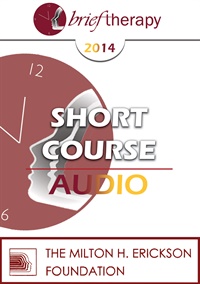BT14 Short Course 22 - Merging Reality Therapy and Ericksonian Principles: Replacing the Effects of Trauma, Depression, and Anxiety - Robert Wubbolding, EdD
- Average Rating:
- Not yet rated
- Topic Areas:
- Anxiety | Depression | Trauma | Short Courses | Ericksonian Hypnosis and Therapy Techniques | Reality Therapy | Brief Therapy
- Categories:
- Brief Therapy Conference | Brief Therapy Conference 2014
- Faculty:
- Robert Wubbolding, EdD
- Duration:
- 1:29:28
- Format:
- Audio Only
- Original Program Date:
- Dec 11, 2014
- License:
- Never Expires.
Description
Description:
A demonstration and a 12-minute DVD illustrate how to assist clients to make effective choices satisfying their needs, especially power or inner control. Merging reality therapy with Ericksonian principles helps clients discover and choose alternatives to the manifestations of past trauma, the pain of powerlessness due to anxiety and depression.
Educational Objectives:
- Describe how two Ericksonian principles interface with the WDEP system of reality therapy.
- Describe three techniques used in reality therapy that empowers clients to replace at least one manifestation of misery with a sense of hope.
- Analyze three applications of reality therapy for dealing with the effects of trauma.
*Sessions may be edited for content and to preserve confidentiality*
Credits
Faculty

Robert Wubbolding, EdD Related Seminars and Products
Robert Wubbolding is an internationally known teacher, author and practitioner of Reality Therapy, having taught Choice Theory and Reality Therapy in the United States, Europe, Middle East and Asia including thirteen countries. Dr. Wubbolding has become synonymous with a branch of psychotherapy called Reality Therapy. His books, presentations and courses served to advance this therapeutic application and brought him personal and professional distinction of international scope. His contributions to the theory and practice include the ideas of "Positive Symptoms," "The Cycle of Counseling," and "5 Levels of Commitment."


